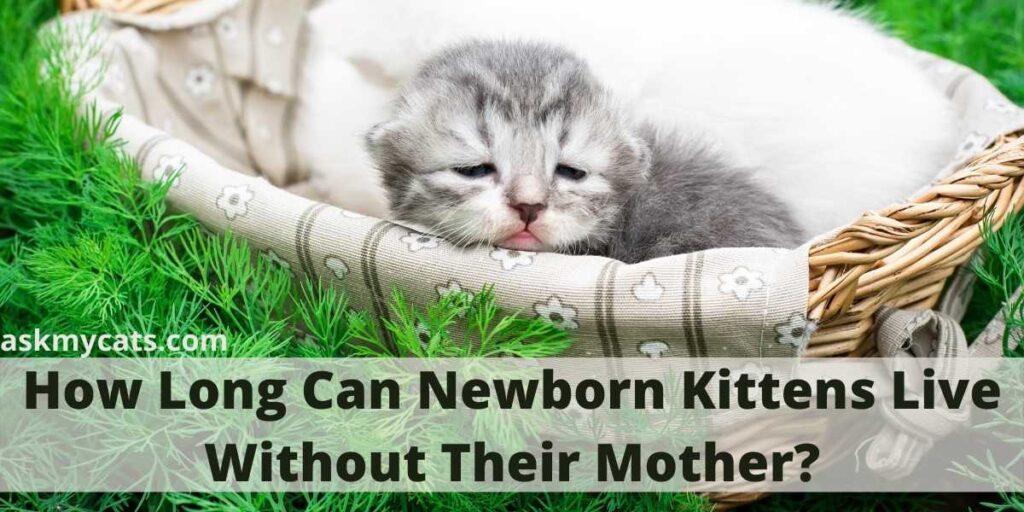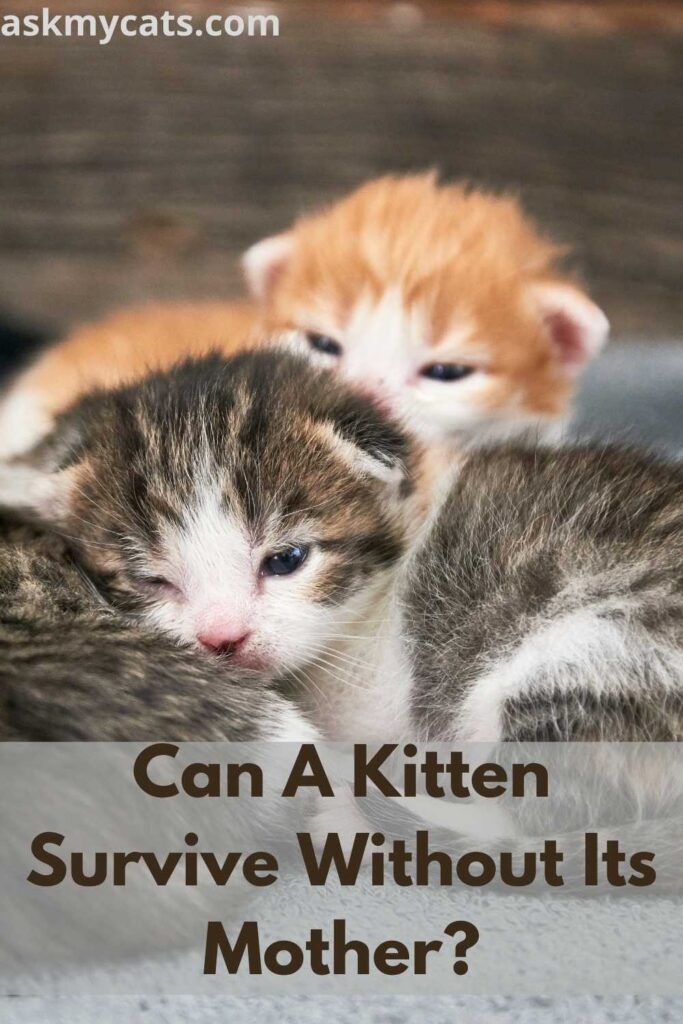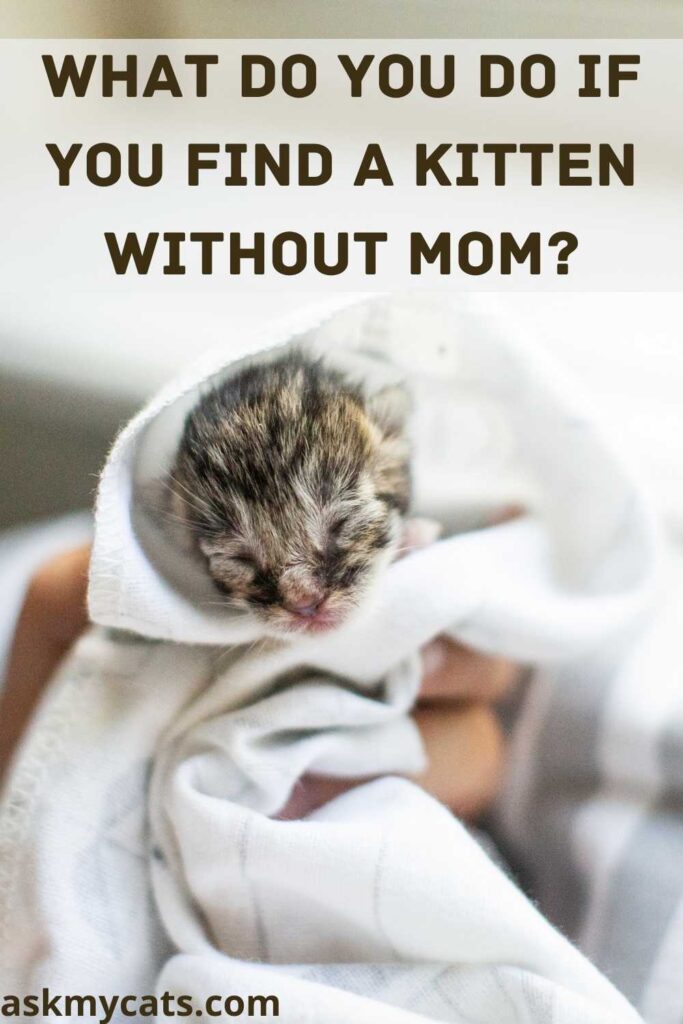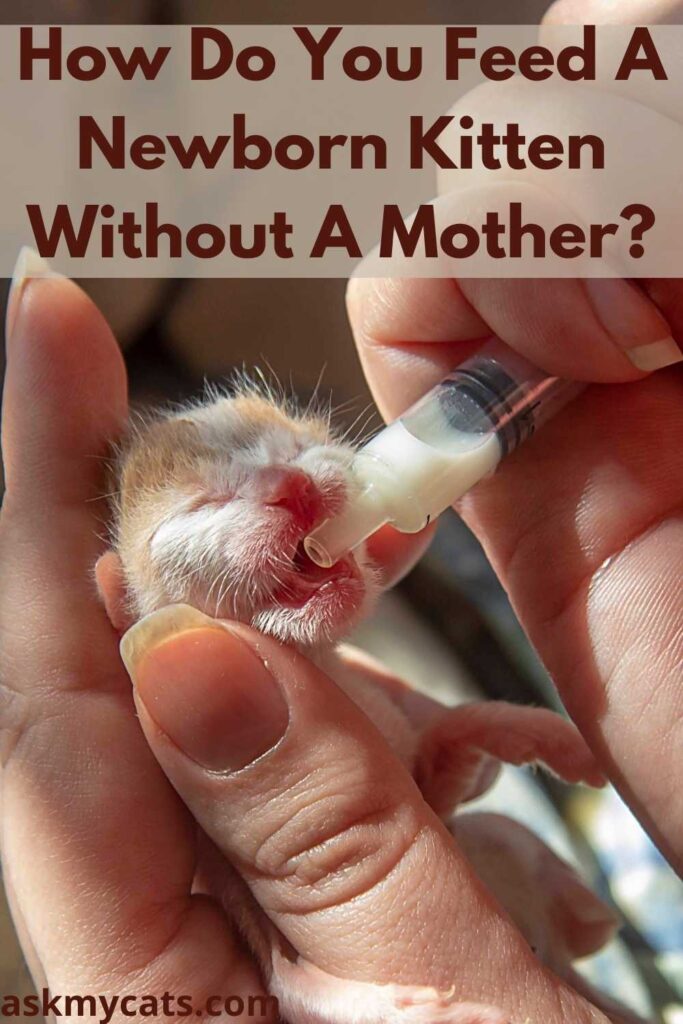You may have found an abandoned kitten and wondered if you should adopt him or her. That’s not a bad option; however, you should be aware that the kitten’s chances of survival are slim.
So, how long can newborn kittens live without their mother?
Newborn kittens cannot survive for more than 12 hours without their mother.
This article will let you know more about the kittens who are without their mothers.

Can A Kitten Survive Without Its Mother?
No, a kitten cannot survive without its mother, without any external aid.

You can come across kitten litters in your area from time to time.
Whether and how you should assist them is much dependent on their age and whether or not Mom is present to care for her children.
Orphaned kittens under the age of four weeks are unable to survive without their mother and must be bottle-fed 24 hours a day, seven days a week.
A kitten’s death can simply be caused by a lack of maternal care.
It’s also your obligation to make sure the kittens are taken care of if the mother cat dies during the birthing process.
You must look after them well to guarantee that they do not go without the things that their mother would have provided.
A mother cat’s milk contains all of the nutrients a kitten needs to grow up healthy. When a kitten is born without a caregiver, its chances of survival are reduced.
A newborn kitten can only survive for a few hours without milk.
Give this article a read to know more about how long can a kitten go without eating.
They will live for 12 hours and then die! However, if you find a three-week-old kitten abandoned by its mother, it can only survive for about 2-3 days without maternal milk or kitten replacement milk.
Only until a kitten is 6 weeks old can he or she survive for an extended period of time.
A kitten is as delicate as a human infant. Mother cat’s milk contains important nutrients that help maintain the cat’s immune system, just as mother’s milk contains nutrients required for the growth of a baby.
As a result, when a kitten lacks that, it cannot survive for long and are susceptible to illness.
Interferences from outside sources can make the kitten or kittens feel unsafe. A mother cat will normally protect her kittens.
As a result, without a mother, a kitten may feel lonely and desire to be cared for.
This can cause the kitten to become stressed and even die.
Kittens learn how to live, what to eat, and so on from their mother. As a result, without such training, a kitten may feel unfit to live in the world and may even be unable to defend itself.
Assume a kitten is alone and cold. This quickly puts him or her on the verge of death.
As a result, if you find a kitten with no sign of its mother nearby, you must take the necessary precautions to ensure its survival.
In addition, the kitten may have suffered some wounds, which can greatly increase his or her chances of dying.
However, before concluding that a kitten is alone, make sure the environment is clean and the kitten appears healthy.
It’s possible that the mother has gone out for a few moments.
Also check out how long can a mother cat be away from her newborn kittens
What Do You Do If You Find A Kitten Without Mom?
Here is what you can do if you find a kitten without a mom: –

1. Analyse The Situation
If you don’t see the mother, don’t assume that the kittens are orphaned.
It’s common for mothers to abandon their babies, so give the kittens some space and wait for the mother to return.
If she does, that’s fantastic! The mother is best suited to care for them, so leave them with her (unless you can take in the entire family and care for them).
If the mother does not return within an hour or two, you must step in and assist.
2. Don’t Take Them To The Shelters
Bringing an orphaned kitten to a shelter is a death sentence unless your local shelter has a program specifically for neonatal kittens.
The majority of shelters do not care for unweaned kittens, so if you want them to get a shot, you’ll have to help them yourself or find someone who can.
3. Act Fast
Time is of the essence when it comes to orphaned kittens. Panic never helped anyone, but you do need to treat this as an emergency.
Gather the kittens and quickly devise a plan for the next 24 hours of care – you can always change your plans later, but for now, you only need to consider their immediate needs.
Take the kitten to a veterinarian if you notice any serious health issues, such as gasping for air or bleeding.
4. Gather Supplies
You’ll need to gather supplies quickly so that you can keep them warm, stable, hydrated, and fed.
To find out what supplies you’ll need, consult my “Preparing for Fostering” supply checklist. Create a cozy, safe haven for the kittens away from any potential dangers.
5. Stabilise Them
You must first ensure that the kitten is not hypothermic or hyperthermic before proceeding. Kittens cannot regulate their body temperature, so help them do so before feeding them – especially if they have been exposed to cold temperatures.
A low-temperature heating pad, a warm water bottle, or even a sock filled with rice and microwaved can all provide a steady but gentle heat source to a cold kitten.
6. Feed Them
Don’t be alarmed if this is your first-time bottle feeding. You can do it, but you’ll need to know some tricks to avoid hurting them.
Please never give cow’s milk to a kitten because it is extremely dangerous to their health and can result in death.
Instead, you’ll need to buy kitten milk replacer, which is available at most pet stores and feed stores.
You must check out What To Feed Newborn Kittens In An Emergency?
7. Stimulate The Kittens To Go To The Bathroom
Some people are surprised to learn that newborn kittens do not go to the bathroom on their own – their mother licks them to stimulate elimination and urination and to keep them clean.
You will need to mimic this behavior by stimulating the kittens with a warm, wet cloth at each feeding.
8. Wash, Rinse, Repeat
Orphaned neonatal kittens require 24-hour care, so establish a routine of care every 2-4 hours (the younger they are, the more frequent the intervals.)
It is normal for kittens to sleep between feedings; just make sure they are in a safe and confined space.
9. Foster Them
Fostering kittens is enjoyable, rewarding, and quick if done correctly! Plan to care for them until they are old enough to be neutered, which should be around eight weeks.
Meanwhile, look for the perfect forever home for them, get them all of their standard veterinary care, and enjoy watching them grow. It won’t be long before you know it!
10. Spay And Neuter Any Cats In The Area
Remember, if you found kittens in an alley, it means there are unsterilized cats nearby. Look for a local TNR (Trap-Neuter-Return) group to help you get the supplies you need to sterilize any free-roaming cats and avoid the next round of kittens!
You must check out Kitten Crying For Mom: How Do I Get My Kitten To Stop Crying For Mom?
How Do You Feed A Newborn Kitten Without A Mother?
Here are the steps you need to take in order to feed a newborn kitten without a mother:–

1. Gather Equipment
You will need a feeding device to feed your newborn kitten.
If at all possible, use a bottle and teat set designed specifically for kittens, such as the Catac bottle and teat set.
The bottle itself is very small, with an open end at the top that allows you to control the flow of milk if it is dripping too quickly from the teat and overwhelming the kitten.
The teat is long and narrow, making it ideal for fitting inside a newborn kitten’s mouth.
As a result, the kitten can suckle as if from her mother. If you do not have a feeding set, the next best option is to use a syringe to drip milk into the kitten’s mouth.
However, the kitten cannot suckle from a syringe, so get a feeder as soon as possible.
2. Sterilise The Equipment
It is critical that all of your equipment is sterile. Simply washing everything is not enough. Consider using a steam sterilizer (as used for baby bottles) or immersing the equipment in a bowl of Milton sterilizing fluid.
Milton sterilizing fluid is available at drug stores, usually in the baby section. Follow the instructions on the package.
If you choose to sterilize your cat feeding equipment with Milton fluid, be sure to rinse everything with boiled water before use to remove any sterilizing solution residue.
Also check out How To Prepare Homemade Kitten Milk Replacer: 4 Recipes
3. Prepare And Heat The Milk
If using a liquid formula, open the can and measure out the amount specified on the packaging.
If using a powder formula, follow the packaging directions for how many scoops and how much water to use.
Always follow the directions precisely because too concentrated milk can cause stomach upset, while too strong milk deprives your kitten of nutrition.
Always make the milk up fresh for each feed. Because the milk contains no preservatives and newborn kittens have weakened immune systems, any bacterial contamination of milk that sits around could be fatal to the kitten’s health.
4. Feed The Kitten
Place a towel on your lap and sit in a comfortable chair. Place the kitten in a position similar to how he would nurse from his mother, with her head straight, feet down, and stomach resting.
Get a drip of milk on the end of the syringe or teat when feeding your kitten for the first time.
Keep it close to the kitten’s mouth. Her sense of smell is acute, and she will almost certainly smell the milk and press her mouth against it.
If you’re using a teat, help her out by wriggling the teat into her open mouth. Nature should then take over and she should start sucking.
If you’re using a syringe, press the plunger gently to release a drop into her mouth. Allow her to swallow in between drops.
Never put milk in her mouth because she may inhale it, get milk in her lungs, and develop pneumonia, which is usually fatal in young kittens. Simply take your time and move slowly.
The posture of the kitten is critical. Never feed a kitten on her back, as you would a human baby, and always ensure the kitten is resting on something when feeding.
Make sure the head is not raised, as this could result in aspiration, or the inhalation of formula into the lungs, which is dangerous and can even be fatal.
Also check out what to feed a baby kitten if you don't have formula
Frequently Asked Questions
Should I check the kitten’s body temperature before feeding?
Yes, you must check the kitten’s body temperature before feeding. When it’s time to feed the kitten, make sure she’s warm. The rate of digestion of a kitten is affected by her temperature to some extent. If she is cool, her digestion is sluggish, and the milk will ferment in her stomach. Newborns typically snuggle close to their mothers and run quite hot. The ideal temperature for the first three weeks of life is 96–100 °F (35.6–37.8 °C).
What signals should I look out for when feeding kittens?
When learning and practicing how to bottle feed a kitten, keep in mind that overfeeding or improper feeding can cause respiratory problems. During feedings, keep an eye on your kitten to ensure that no milk is coming out of the nose and that the stomach does not feel distended. Look at her tummy if you have a greedy kitten and she keeps sucking even though she’s exceeded the recommended amount. Stop feeding if her stomach is tight and distended. This is a sign that her stomach is full but she isn’t aware of it. Do not overfeed.
What is the ideal age to adopt a kitten?
Kittens should ideally go to their new home around the age of 12 weeks. While some kittens can be taken home sooner, the closer you get to 12 or 13 weeks, the better off the kitten will be. Allowing your cat to spend extra time with its mother and littermates increases its chances of being healthy, well-socialized, and properly developed.
Final Words
When you come across a kitten, always check to see if the mother is nearby. If no one comes looking for it, put it in a box with bedding and keep it warm.
If the kitten is hungry, you can give it kitten replacement milk to help it grow stronger in the absence of the mother’s milk.
You should then take the kitten to the vet to check for any complications or wounds.
Keep the kitten away from other larger pets and protect it when you bring it home to avoid stress, fear, or anxiety.
If you have any questions, ask us in the comments section.

